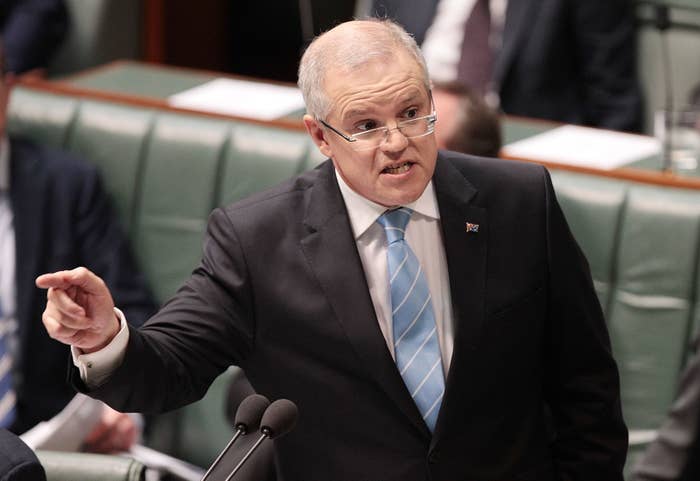Treasurer Scott Morrison has repeatedly refused to say whether he would vote in favour of same-sex marriage if a plebiscite on the issue is carried.

Even if a national plebiscite on marriage is carried by the Australian people, it will still require a parliamentary vote to legalise same-sex marriage.
Morrison, who opposes same-sex marriage, has said several times he will "respect the outcome" of the government's proposed national vote on marriage.
But in an exchange with Leigh Sales on the ABC's 730 program, Morrison repeatedly declined to clarify whether that meant voting in favour if the Australian people vote "yes".
Sales: "If we can turn to another matter before we run out of time. The same-sex marriage plebiscite. If your own electorate voted against same-sex marriage in the plebiscite, would you vote against same-sex marriage in the parliament?"
Morrison: "I've always said, I've been a proponent of the plebiscite and my view is, if it is carried nationally, the legislation should pass.
Sales: "So would you vote for it?"
Morrison: "If the plebiscite is not carried, then I think that settles the matter."
Sales: "But if the plebiscite is carried, will you vote for same-sex marriage?"
Morrison: "I've said I will respect the outcome of the plebiscite."
Sales: "Why can't you just answer that question clearly – will you vote for same-sex marriage, yes or no?"
Morrison: "I will use my words, you yours and you're not allowed to put words in my mouth. I've said I will respect the outcome of the plebiscite entirely."
Sales: "I would like clarity for our audience, and I think that answer doesn't make it clear. Will you vote for same-sex marriage, yes or not?"
Morrison: "What I will do is respect the outcome of the plebiscite. If it passes then the legislation will pass. I give you that commitment."
Sales: "With your vote?"
Morrison: "I will respect the outcome of the plebiscite."
Sales: "I'm not sure why you can't answer if it will be with your vote."
Morrison: "I get to choose the words I use as a politician, you get to use the words you use to put questions, that's how it works."
Sales: "We will allow our viewers to make their judgement as to what they think you will do."
A similar exchange took place on the ABC's Lateline with foreign minister Julie Bishop, who supports marriage equality.

In an interview with Emma Albericie, Bishop declined to clarify whether she would vote in accordance with the views of her electorate or that of Australia as a whole.
Albericie: "If the plebiscite does go ahead and the majority of Australians support marriage equality, but your specific electorate votes against same-sex marriage, how will you vote in the Parliament?"
Bishop: "Well, that will depend on the plebiscite vote overall, how it is broken down and what it looks like, state by state, electorate by electorate and then, of course, it will depend what the legislation looks like. But I would respect the outcome of the plebiscite obviously."
Albericie: "But would you be more inclined to vote on how the majority of Australians have voted or how your particular electorate voted?"
Bishop: "Well, I would take my electorate's views into account, but I would also take into account how the plebiscite played out across Australia because, for example, a referendum gets up if it is the majority of states, majority of people in the majority of states. So if that is the way it played out–"
Albericie: "Pardon the interruption, though. This is not a referendum?"
Bishop: "I know. I was saying if it were a referendum, it gets up with a majority vote in a majority of states. As a plebiscite, if majority passes it across Australia that is pretty compelling."
Albericie: "And that is how you would vote?"
Bishop: "I would wait until I see the legislation. This is all hypothetical. What we have said is we will have a plebiscite so everybody in Australia can have their say and I support that and I think it is a good idea."
Albericie: "But you won't tell us how you would eventually vote, whether you would follow the mandate of the people if they have decided to vote as a majority in favour of marriage equality?"
Bishop: "Well, I always have a look at what the legislation says and I will respect the outcome of the plebiscite."
Prime minister Malcolm Turnbull confirmed on Friday that no Coalition MP would be bound to vote based on the plebiscite results. However, it is unclear how the government intends to guarantee passage of a same-sex marriage bill.
Some MPs have indicated they would vote against marriage equality regardless, senator Zed Seselja has indicated his intention to abstain, and others, like Morrison, have remained ambiguous.
A spokesperson for the Coalition did not directly answer questions from BuzzFeed News about whether an agreement had been struck regarding abstentions, or what, exactly, "respecting the outcome of the plebiscite" entails.
“If the majority of Australians vote ‘yes’ in the plebiscite, their decision will be respected by the Government and the Parliament and same-sex marriage will be legalised in Australia,” the spokesperson said.
“The government is confident the Australian people will conduct themselves in a respectful and dignified manner during the debate.”

